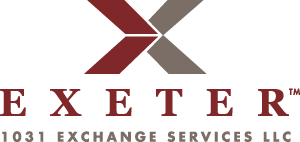The Role of the Qualified Intermediary
What is a Qualified Intermediary? Generally, a professional, experienced, institutional Qualified Intermediary, such as Exeter 1031 Exchange Services, LLC, is an entity established to administer and facilitate your 1031 Exchange transaction. The Qualified Intermediary should have the experience, expertise and track record to assist you all the way through your 1031 Exchange transaction.
A good, reputable Qualified Intermediary is critical in the structuring and completion of a successful 1031 Exchange transaction. The Qualified Intermediary, often referred to in the real estate industry as an Exchange Accommodator or Exchange Facilitator, is authorized and required under Section 1.1031 of the Department of the Treasury Regulations and is the central component in a 1031 Exchange transaction.
Licensing, Regulation, and Government Oversight
Qualified Intermediaries are not licensed, regulated, audited or otherwise monitored by any government or regulatory agency, and Qualified Intermediaries are not required to be bonded, insured or maintain any other form of minimum equity capitalization in most states. Therefore, choosing a Qualified Intermediary that IS licensed, regulated and audited by a regulatory body such as a banking regulator is critical to ensure that the Qualified Intermediary is operating in a safe and sound manner.
Exercise Care in Selecting Your Qualified Intermediary
You should exercise significant care when evaluating and choosing your 1031 Exchange Qualified Intermediary because of the crucial role it will play in administering your 1031 Exchange. We recommend that you review our web page entitled Choosing a SAFE Qualified Intermediary, which was written to assist you in the careful evaluation, analysis and selection process of Qualified Intermediaries today.
The Role of the Qualified Intermediary
Qualified Intermediaries are responsible for a number of important elements in the administration of a successful 1031 Exchange transaction, including (1) preparing the 1031 Exchange agreements and related transactional documents to properly structure the 1031 Exchange transaction; and (2) receiving, holding and safeguarding your 1031 Exchange funds throughout the transaction; and (3) advising or consulting with you and your professional advisors regarding the implementation of your 1031 Exchange transaction to ensure compliance with all applicable Internal Revenue Codes, Department of the Treasury Regulations and related Revenue Rulings and Revenue Procedures.
Preparation of Legal Documentation
The drafting of the 1031 Exchange agreements and related transactional documents is crucial in the proper structuring of a successful 1031 Exchange transaction. A single mistake in the preparation of the legal documentation could result in the disallowance of your 1031 Exchange transaction by the Internal Revenue Service or state taxing authority, and the subsequent recognition by you of the depreciation recapture and capital gain income tax liabilities along with interest and penalty assessments by the Service.
The Qualified Intermediary must possess the necessary experience, expertise and track record to ensure a thorough review of the related transactional documents and a complete understanding of your 1031 Exchange transaction. This in depth understanding of your transaction by the Qualified Intermediary will ensure the 1031 Exchange agreements and related documents will be completed accurately.
Holding, Protecting and Safeguarding 1031 Exchange Funds
Another important responsibility that is arguably just as critical as the rest is the Qualified Intermediary’s fiduciary duty of receiving, holding and safeguarding your 1031 Exchange funds. Qualified Intermediaries hold your 1031 Exchange funds to prevent constructive receipt of the 1031 Exchange funds by you. Qualified Intermediaries hold significant amounts of 1031 Exchange funds on behalf of thousands of investors just like you and therefore have a tremendous fiduciary responsibility to protect the funds under its custody.
Technical Ability: Providing Guidance
Perhaps the most frustrating element for investors is preparing and planning for their 1031 Exchange transaction. You have probably spoken to one Qualified Intermediary and received one answer and then spoken to another and received a completely different answer. Then consulted with your legal, tax and financial advisors and received three more completely different answers.
The 1031 Exchange industry has many gray areas because there are many unanswered questions in Section 1031 of the Internal Revenue Code and Section 1.1031 of the Treasury Regulations, which explains why you may often receive so many different answers (which really represent opinions and not true answers).
Therefore, perhaps the most important role of all is for the Qualified Intermediary to help you unravel the mystery of the 1031 Exchange by ensuring that its 1031 Exchange administrators are properly trained and have sufficient experience and expertise to provide the necessary guidance, advisory and consultative services to help guide you through the mysteries within 1031 Exchange industry.
Disqualified Persons Can Not Act as a Qualified Intermediary
Certain persons are specifically prohibited from serving as your Qualified Intermediary. You are not permitted to serve as your own Qualified Intermediary. Your real estate broker, securities broker, attorney, or accountant, anyone acting as your agent, or an otherwise disqualified (related) person under Section 267(b) and 707(b) of the Internal Revenue Code can not serve as your Qualified Intermediary.
Avoid Conflicts-of-Interest and Individuals
You should avoid companies that provide replacement property solutions and also serve as a Qualified Intermediary, which creates an automatic conflict-of-interest (best case) or possibly a disqualified exchange if deemed to be a disqualified person (worst case). You need a Qualified Intermediary that puts your interests first. You don't want one that is more worried about getting paid on the replacement property solution and less worried about the administration of your 1031 Exchange.
Individuals may serve as a Qualified Intermediary, but it is not recommended because the death, divorce or bankruptcy of the individual may have a catastrophic effect on your 1031 Exchange transaction and/or otherwise compromise the 1031 Exchange funds.
You should always choose a professional, experienced, institutional Qualified Intermediary, such as Exeter 1031 Exchange Services, LLC, that also has government oversight.
